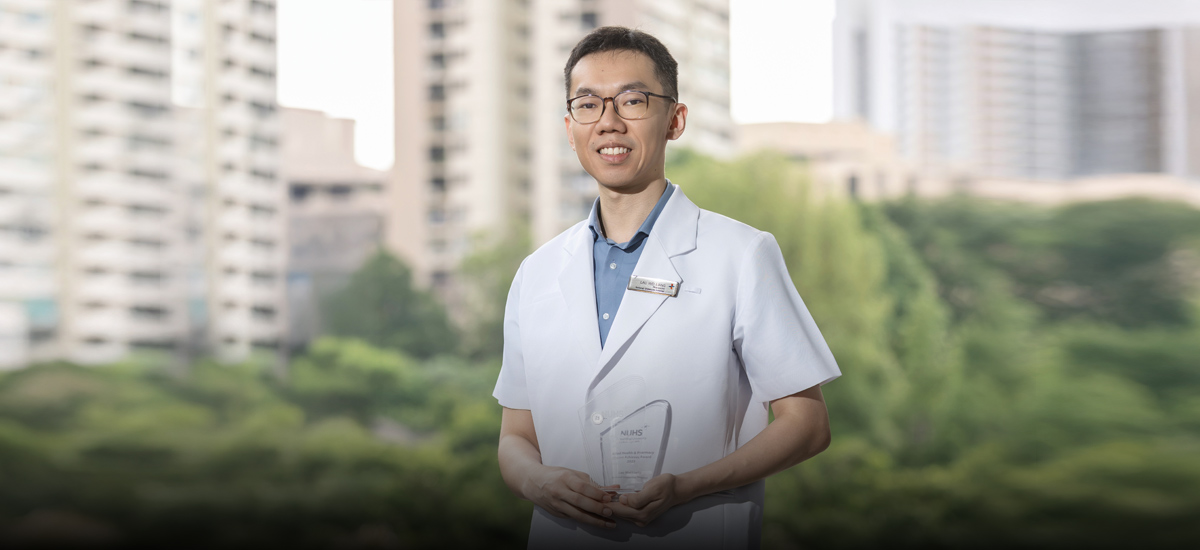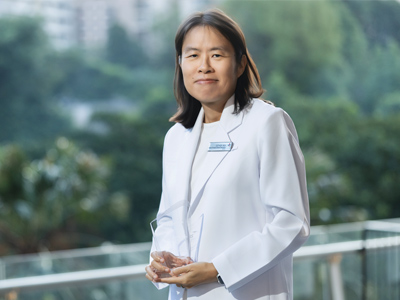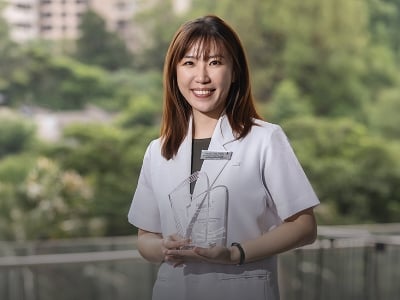Published on 21 October 2025
Mr Lau Wei Liang’s passion for redesigning systems is improving lives all around.
When Mr Lau Wei Liang saw how long it took doctors to order a simple outpatient vaccine, he knew something had to change. Each prescription meant multiple clicks: one for the drug, another for the order and a separate code for nurses to administer it. “It just didn’t make sense,” recalled the Senior Clinical Pharmacist at National University Hospital (NUH).
As such, he decided to reconfigure NUH’s EPIC electronic medical record system to automate most of the steps, which led to significant time savings for clinicians, as well as improved patient safety. The initiative earned him a Get Rid of Stupid Stuff (G.R.O.S.S.) commendation award and confirmed what his colleagues already knew: Mr Lau is a natural problem-solver.
His problem-solving spirit is matched by clinical range, with the 36-year-old trained to cover adult intensive care, paediatrics, solid organ transplant, antimicrobial stewardship and neuroimmunology. “When you’re on night duty, you don’t get to choose what comes through the door,” he said. “You need to know a bit of everything.”
His versatility stems from NUH’s Postgraduate Pharmacy Residency he completed in 2019, followed by a Master of Clinical Pharmacy in 2024. Today, he is the lead pharmacist for neuroimmunology and collaborates with neurologists to secure restricted-access drugs and establish safe initiation protocols.
Mr Lau is at the heart of NUH’s prescribing system, which is used by doctors, pharmacists and nurses. He reviews order pathways, and coordinates with other NUHS institutions to streamline changes. His focus is simple: make the system safe for patients while reducing the risk of mistakes in dosage and dispensing. “A simpler process is always better,” he said. “If it saves time and improves safety, that’s a win for everyone.”
Putting people first
Mr Lau’s impact extends to his colleagues’ wellbeing. As NUH’s roster master since 2015, he has balanced operational demands with fairness for staff. As pharmacy is a 24/7 service, staff leave allocation can be a sensitive subject. To ensure fairness, Mr Lau introduced the “trump leave” system, which lets staff book early for peak periods such as Chinese New Year or school holidays. He also created a two-night-shift option to reduce fatigue, exempting pregnant staff from overnight duties and prioritising parents during school breaks.
“The key is communication,” he said. “If you’re upfront about constraints, people understand. What matters is that they feel heard, and that we try to make it fair.” His efforts helped boost the Employee Engagement Satisfaction Score for the Inpatient Pharmacy in 2024, showing how operational tweaks can transform morale.
An eye on tomorrow
Mr Lau is clear-eyed about the future. He believes artificial intelligence (AI) and automation will take over routine checks and repetitive queries, but insists the human role remains irreplaceable. “If a patient is on three or four complex drugs, the system will flag interactions. But only a pharmacist can decide what’s safe,” he explained.
He also sees more pharmacists moving into informatics, shaping systems like EPIC while keeping clinical realities in view. AI, he believes, should be seen as a tool to free up time for deeper patient care and complex decision-making. “We can’t rely on AI blindly. Pharmacists still need a strong foundation in medication knowledge, and the ability to validate and interpret,” he said.
For him, the ultimate purpose is straightforward: ensuring patients leave the hospital safe and well. “Sometimes, work can feel mundane, but at the end of the day, it’s all for the patient,” he said.
This year, Mr Lau received the Excellence Award at the NUHS Allied Health & Pharmacy Awards, which honour allied health professionals and pharmacists who significantly advance clinical care, research and education while empowering colleagues around them.
His career captures what NUHS champions in its Healthcare Workforce of the Future: Professionals who are adaptable, collaborative and committed to improving both outcomes and workplace culture. But Mr Lau keeps his motivation straightforward. “If something isn’t done properly or up to standard, that drives me to fix it,” he said.
Looking ahead, he is focused on completing the “nitty-gritty” refinements of NUH’s EPIC system, a rollout that still requires careful clean-up. After that, he expects to contribute to the development of the new Kent Ridge campus. But he is also mindful that leadership means preparing others to take the baton. “I can’t be the only one handling these things forever,” he said. “It’s important that younger pharmacists step up, get involved and even do it better than I did.”
That humility – coupled with a relentless drive to improve – may be his proudest achievement yet. “I don’t think a pharmacist’s proudest moments are usually documented,” he added with a smile. “For me, it’s enough knowing I’ve solved problems that mattered, for patients and for the team.”
The NUHS Allied Health & Pharmacy Awards celebrate individuals who have made outstanding contributions to patient care, education, research and professional practice across the National University Health System (NUHS).
Click here to find out more about the various Allied Health Professionals.
In consultation with Mr Lau Wei Liang, Senior Clinical Pharmacist, NUH.




